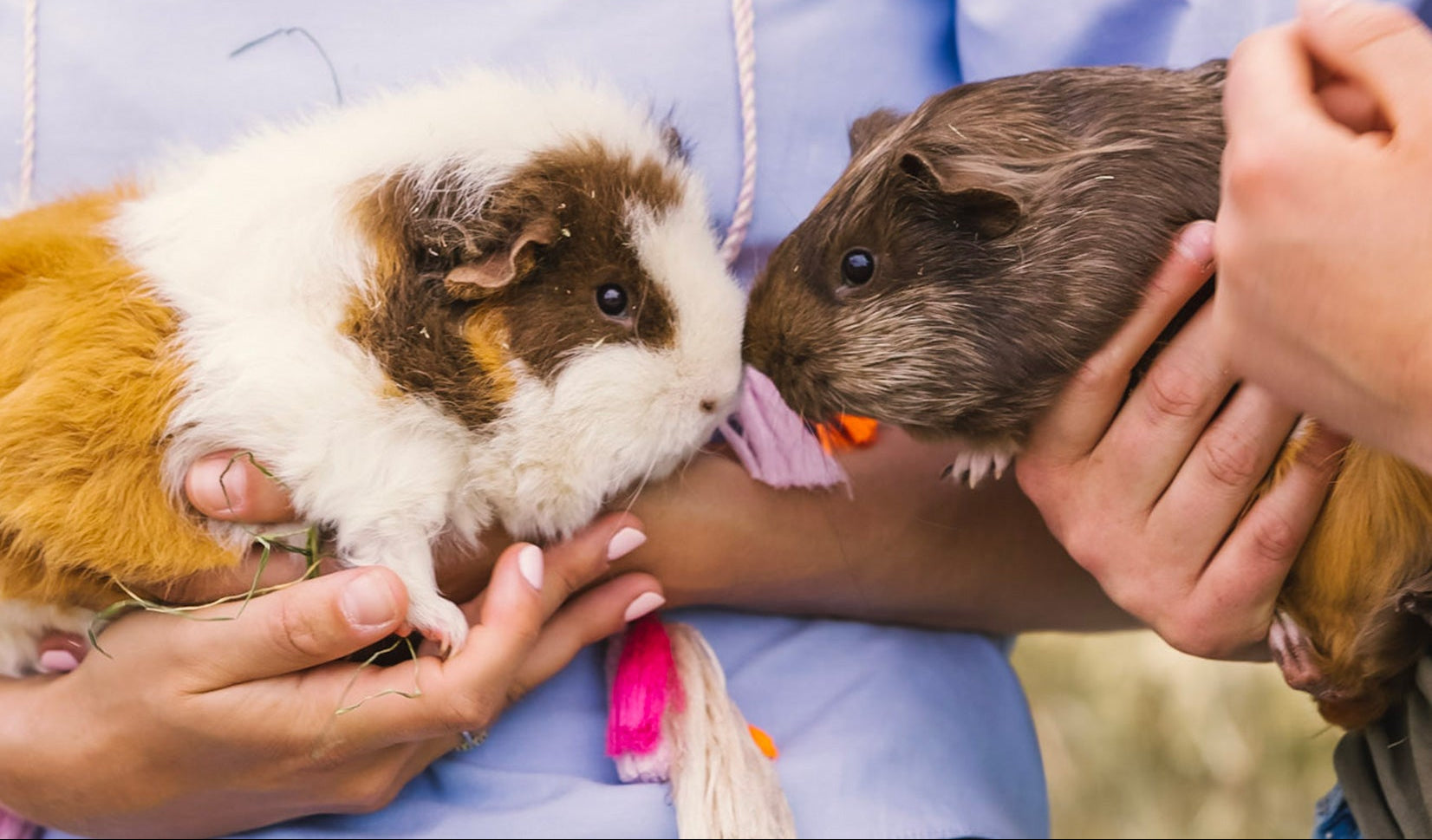Rabbit care guide – helping you with your rabbit’s health and happiness
On this page, you’ll find everything you need to know about rabbit care and caring for your rabbit. Find detail of the basics of bunny care, feeding your bunny and veterinary care.
What you need to know about rabbits
Rabbits are wonderful pets. They are cute, fluffy, friendly and intelligent. They can even be trained to come when you call them.
The list of interesting facts about rabbits is endless, so much so that we created a fun-facts about rabbits’ blog to answer as many of the most asked questions about rabbits as we could.
Rabbits need an excellent source of food. Domesticated rabbits mainly eat hay as this helps them with their digestion and tooth health and is as close to their natural diet as possible. A quality Timothy Hay like the one created by us will be sure to keep your rabbit in tip-top condition.
Rabbits need a lot of space to exercise, plenty of fresh hay and lovely green leaf treats. A fresh source of water is critical, and they adore plenty of cuddles and fun playtime too.
Wild rabbits have a lifespan of only one to two years, whereas a domesticated rabbit will on average live 8-12 years. Rabbits are increasingly being kept indoors and can even be toilet trained. They will still need plenty of safe outside space to explore and enjoy.
Rabbits are not the perfect first pet for a child. They need a lot of care and looking after, and the costs involved can be surprising. However, with experience and knowledge, having a rabbit in the family will be a wonderful experience.
Costs and time in keeping rabbits
Rabbits are social animals, so you’ll need at least two to keep each other company. You’ll also want to make sure they are neutered to avoid increasing your rabbit family exponentially. Having two pets increases the time and costs involved too. Things you will find yourself doing daily include grooming, feeding and water renewal, health checks, exercising and playtime. When added up, it can take a minimum of an hour per day but often longer.
There are a lot of costs to consider when keeping rabbits, from microchipping, vaccinations, neutering, food, hutches, toys, hygiene equipment, veterinary health checks, accommodation, maintenance, insurance and more. The RSPCA estimates a pair of rabbits will cost around £1500 per year.
For a list of what to expect in time and costs when keeping rabbits, we recommend you read the RSPCA Costs and time involved in keeping rabbits guide. This breaks down everything involved in rabbit care and associated costs, so you can go in with your eyes wide open.
Choosing a healthy rabbit
Adopting a bunny is an exciting time for anyone, it is easy to just pick the prettiest or fluffiest one you see. But you do need to make sure the rabbit you are picking is healthy. Things to look out for include making sure the animal you like is bright, alert and active. A floppy bunny is not a good sign. Adopting from a reputable Rescue is a great way to choose a bun friend or two, they will ensure they are fully vaccinated and neutered as well as give you a heads up on any upcoming appointments needed. Some buns will come with pre-existing medical needs but rescues will be clear and up front about these and often help support you to meet them.
A healthy bunny will have shiny deep luscious fur and look nice and plump, evidence of a good appetite. If the litter you are looking at has one or two apparent sickly animals, then the others may get ill shortly afterwards too, so be wary of picking an apparent healthy littermate.
The nose knows. A dry and constantly twitching nose is a good sign of a healthy rabbit, sniffles is not.
When choosing a young bunny, look for brightness, inquisitive nature, have a good appetite, a lovely fur coat and full of energy. Check the eyes and nose for dryness (you want dry and clean), their teeth should all look normal.
Bunny behaviour
A healthy, happy bunny will be an active one. Rabbits are intelligent creatures and need stimulation. They will spend a lot of time foraging for food, so it is a good idea to make them work for any good treats you decide to give them by hiding them. Rabbits also need a lot of space so they can dig, run and jump, as well as stretch themselves out. Rabbits kept as pets are social animals and need companionship, both from other bunnies and you.
A critical element in keeping your bunny’s behaviour normal is a good diet. That’s why at The Little Hay Co. we spend so much time making sure the hay we create is the best it can be for your bunny. We also stock a wide range of bunny safe natural treats and forage which all complement a healthy balanced diet.
Outdoor living
Space is key. Rabbits need plenty of space to explore, exercise, forage, dig and have fun. They also need safe places to retreat when they feel nervous or endangered. Their pen needs to be protected from any predators and kept clean regularly. When enclosed, they also need height so they can stand up. The Rabbit Welfare Association recommends that your outdoor hutch be a minimum of 3m x 2m x 1m to allow your rabbits to hop, stretch, stand up and move around easily. 3m in length is keep to allow your bun to do a series of hops and jumps called binkies! Rabbits should never be limited to a hutch and more and more hutches are being seen as unsuitable for rabbits as they cannot stand or stretch in them. They can be used as part of a wider set up as a hide. Rabbits will need a nice long, predator proof run to explore, exercise and enjoy. You’ll also want to bunny proof your garden for times when you let them roam free.

Indoor living
Rabbits can make excellent indoor pets. They are intelligent so can be trained, up to a point. Training them to use a litter tray is possible. House bunnies are increasingly popular, but you will need to provide similar facilities to an outdoor rabbit. A high puppy style pen (at least 36 inches) works well. Plastic sleeves for any exposed wiring is also a necessity as your rabbit will happily nibble through wires without thinking twice. Lots of hides and soft furnishings are increasingly popular.
Protect your home
You will also want to protect your furniture and pretty much everything else. A bunny will explore and then chew pretty much anything within reach. Give your bunny a lovely source of quality hay from the Little Hay Co. to eat and they will be less inclined to chomp through your book collection (no guarantees!). Protect things like skirting boards, table legs, low lying books, magazines etc.
Zone your home
Stair gates are an excellent way to zone your home and keep your bunnies where you want them. A litter tray should be provided, similar in size to a cat litter tray should work fine.
Rabbits need company
Rabbits need a companion or two. Rabbits should be kept in groups or pairs as they need a bun friend. Solo buns can become depressed even with lots of human interaction. The bonding process can be difficult, seek help from a reputable rescue.
Exercise your rabbit
Indoor rabbits need just as much exercise as outdoor rabbits, so should be allowed to roam free every day. Make sure they have stimulating things to do, such as toys or cardboard boxes they can chomp through, as rabbits will get bored easily.
If you bring a rabbit into your home, then expect the same disruption as other house pets like cats and dogs. But similar companionship rewards.
Feeding rabbits
Rabbits require food constantly. The best food for a rabbit is fresh hay, this should be provided daily in a clump the same size as the rabbit itself. There are multiple types of hay, all with different benefits for rabbits. Check out our blog on Hay for rabbits for full details. A rabbit’s diet is made up of 85-90% hay with additional good treats or grass. By good treats, we mean nice green leafy vegetables regularly and a small slice of fresh fruit occasionally. There are other treats rabbits can eat, but these should be given sparingly, including carrots, hibiscus flowers and other commercially available healthy treats.
What should never be fed to a rabbit
There are a few things rabbits should never be fed. These include bread, oats, seeds, food high in starch and high grain mixes. Potatoes, iceberg lettuce, onions, garlic and corn kernels should also be avoided.
Alfalfa hay should not be fed to adult rabbits unless they are ill or nursing their baby bunnies and need extra help. Learn more about Alfalfa hay.
Freshwater
Every animal needs fresh water to survive, so you should always make sure your bunny has a good supply of clean, fresh water every single day.
Rabbit food sheet
The rabbit food sheet provides a rabbit food list including green leafy plants, non-leafy vegetables, fruits, flowering plants, and herb plants. It is also important to know when and how much they should eat from each food group, so we included them in the list as well.
Check out what your rabbit can eat daily, the treats and what they shouldn't eat.
Download your printable rabbit food sheet here:

What do I need to take my rabbit to the vet for?
Rabbits need various visits to the vet to keep them in good health.
Annual or Bi-annual health check
Every 1-2 years your bunny should visit the vet to have a general check-up to see that they are healthy. They will check things like their weight, teeth length, health and angle of growth. They will also check your rabbit's breathing, heart rate and make sure their eyes and ears look healthy.
Vaccination
In the UK and Europe rabbits have regular vaccinations to prevent Myxomatosis and both types of Haemorrhagic disease (RHD1 and RHD2). Previously your rabbit would need two separate injections, but a new vaccination called Myxo RHD Plus will protect them against all three diseases. Your rabbit should be regularly vaccinated against these diseases. Once every 12 months.
Sterilisation
If you do not want a tonne of bunnies running around your house or garden, then sterilisation is your best option. The female usually sterilised before they turn one year old. For a male, you can castrate them from 5-months onwards.
Things to look out for in the health of your rabbit
Simple rabbit health checks should be completed daily. These include making sure their eyes are bright and clear with no discharge. Check their teeth are not overgrown or have chips and sharp edges. Rabbits' noses should be regularly twitching and not runny. Keep an eye on your rabbit's drinking and eating habits as loss of appetite is a sure sign something is wrong.
Your rabbit’s fur should be shiny and not matted or have bald patches. Their ears should be clean and free of discharge. Other simple checks involve looking at their feet for wounds or lumps, checking their body for lumps and their stomachs for any swelling.
How to tell if your rabbit is happy
If your rabbit is bright, energetic and engaged in an activity, it’s a good sign you have a happy bunny. Also lying down with a relaxed body or fully stretched out body is an outward sign of your rabbit being relaxed and happy. Rabbits will jump in the air if they are happy too (jump for joy). A good appetite means your bunny is healthy and happy and even a calm and quiet demeanour is an outward sign of contentment too.
How to look after a baby rabbit
Looking after a baby rabbit can be intensive. You should not have your baby rabbit until it is eight weeks old at the earliest. Your rabbit will already be starting to nibble at hay and pellets but will need all the nutrients and care its mother provides to guarantee a healthy start to life.
Visit How to look after baby rabbits for more detailed information.













